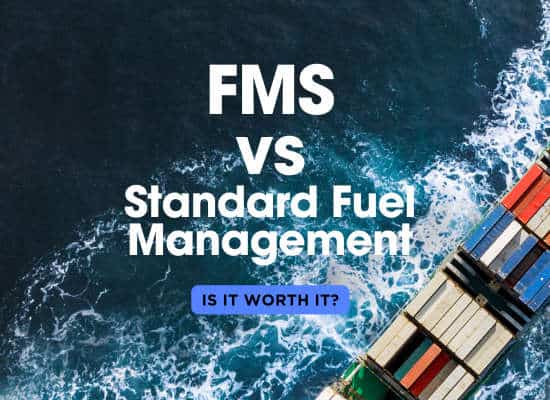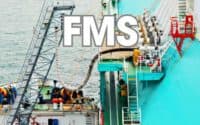Standard Fuel Management vs. Fuel Monitoring Systems (FMS)

In the maritime industry, fuel management is critical to operational efficiency and cost savings. As fuel prices continue to rise and environmental regulations become stricter, shipowners are increasingly exploring more advanced solutions to manage their fuel consumption. Traditional methods of fuel management often rely on manual tracking and estimates, which leave room for inaccuracies and inefficiencies. On the other hand, modern Fuel Monitoring Systems (FMS) provide real-time, data-driven insights that promise to optimize fuel consumption, reduce costs, and improve compliance with environmental standards.
Fuel Efficiency and Consumption Monitoring
In today’s maritime industry, fuel management is more than just tracking consumption—it’s about optimizing efficiency, reducing costs, and staying compliant with increasingly strict environmental regulations. Traditional fuel management systems, often manual or basic, offer limited insights and can lead to inefficiencies, regulatory challenges, and missed opportunities for savings. Fuel Monitoring Systems (FMS), on the other hand, provide real-time data and advanced analytics that help shipowners make informed decisions to improve operational performance and profitability.
Quick Compare
| ShipUniverse: Elements of Fuel Management – Standard vs. FMS | ||
| Fuel Management Element | Standard Fuel Management | Fuel Monitoring Systems (FMS) |
| Real-time Fuel Consumption Tracking | ❌ | ✔️ |
| Historical Fuel Consumption Data | ❌ | ✔️ |
| Fuel Usage Optimization Recommendations | ❌ | ✔️ |
| Emission Tracking (CO2, SOx, NOx) | ❌ | ✔️ |
| Automatic Regulatory Compliance Reporting | ❌ | ✔️ |
| Manual Fuel Level Monitoring | ✔️ | ✔️ |
| Real-time Alerts for Fuel Inefficiencies | ❌ | ✔️ |
| Engine Performance Monitoring | ❌ | ✔️ |
| Port Call Efficiency Tracking | ❌ | ✔️ |
| Predictive Maintenance Integration | ❌ | ✔️ |
| Manual Entry of Fuel Data | ✔️ | ❌ |
| Remote Fleet-Wide Monitoring | ❌ | ✔️ |
| Long-term Fuel Savings (5-15%) | ❌ | ✔️ |
Key Points
| ShipUniverse: Fuel Efficiency and Consumption Monitoring | |||
| System Type | Accuracy of Fuel Data (% Difference) | Potential Fuel Savings (%) | Detection of Inefficiencies (Yes/No) |
| Standard Fuel Management | 5-10% variance | Up to 5% potential savings | No |
| Fuel Monitoring Systems (FMS) | 1-2% variance | 5-15% potential savings | Yes |
| ShipUniverse: Cost of Implementation and Maintenance | ||||
| System Type | Installation Cost (USD) | Annual Maintenance Cost (USD) | ROI (Years) | Long-term Operational Cost (10 years) |
| Standard Fuel Management | $0-$5,000 (manual systems) | $1,000-$3,000 | Immediate, but minimal savings potential | $10,000-$35,000 |
| Fuel Monitoring Systems (FMS) | $20,000-$50,000 | $2,000-$5,000 | 2-4 years (depending on fuel savings) | $40,000-$80,000 |
| ShipUniverse: Environmental and Regulatory Compliance | |||
| System Type | Compliance with IMO 2020 (Yes/No) | Emission Reduction Potential (%) | Environmental Reporting Capabilities (Yes/No) |
| Standard Fuel Management | Partial (dependent on manual record-keeping) | 0-5% | No |
| Fuel Monitoring Systems (FMS) | Yes (real-time tracking ensures compliance) | 5-15% | Yes |
FMS Tips
1. Start with a Pilot Program 🚀
Before rolling out FMS across your entire fleet, start with a pilot program on one or two vessels. This allows you to test the system, understand the data, and fine-tune the implementation process without committing to a full-scale deployment. Once you’ve seen the benefits firsthand, scaling up becomes easier and more cost-effective.
2. Integrate FMS with Existing Systems 🔗
FMS works best when integrated with other onboard systems like engine performance monitoring, navigation systems, and maintenance schedules. Make sure your FMS can communicate with your ship’s current infrastructure to gather more comprehensive data and improve overall operational efficiency.
3. Train Your Crew for Maximum Effectiveness 👩✈️
Even the most advanced FMS is only as good as the people using it. Invest in proper crew training to ensure that they understand how to interpret the data, respond to alerts, and make informed decisions. This will lead to better fuel management and more efficient ship operations.
4. Leverage Real-time Data for Immediate Adjustments ⏱️
One of the greatest advantages of FMS is real-time data. Don’t wait until a report is generated—use the system’s alerts and insights to make immediate adjustments to fuel consumption, engine performance, or route changes. The faster you respond, the more you’ll save in fuel costs.
5. Regularly Review and Analyze Data 📊
Implementing FMS isn’t a one-time thing—make it part of your regular operations to review the data the system generates. Monthly or quarterly reviews can help identify patterns, inefficiencies, or opportunities for improvement that might otherwise go unnoticed.
6. Set Clear KPIs for Measuring Success 🎯
Before implementing FMS, establish key performance indicators (KPIs) such as fuel consumption reduction, emission levels, and maintenance cost savings. Having measurable goals will help you evaluate the success of the system and make adjustments as needed.
7. Take Advantage of Predictive Maintenance 🔧
FMS can predict engine issues before they happen. Make sure to leverage this data to perform maintenance proactively, reducing downtime and costly repairs. This feature is especially valuable for extending the lifespan of your engines and other critical components.
8. Stay Compliant with Automated Reporting 📝
Use FMS to automate environmental reporting and ensure compliance with IMO 2020 and other regulations. This reduces the workload on your crew and ensures that you are always up-to-date with regulatory requirements, avoiding costly fines.
9. Optimize Routes Based on Fuel Data 🛤️
One often-overlooked advantage of FMS is route optimization. By analyzing fuel consumption patterns and weather conditions, FMS can suggest more fuel-efficient routes. This can lead to reduced fuel usage and faster voyage times.
10. Monitor Fleet-wide Performance Remotely 🌍
If you manage multiple vessels, use FMS to monitor your fleet’s performance from anywhere in the world. This not only saves you time but also allows you to quickly identify any vessels that aren’t performing optimally, enabling faster intervention.

Do you have any feedback or additional insights? Please reach out to editor @ shipuniverse.com

